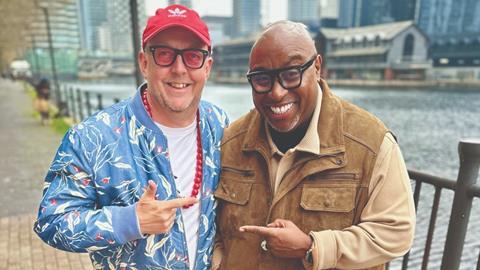Making friends with people unlike you is the smart thing to do. Diverse relationships bring great advantage in life, business and church. But best of all, they bring God’s kingdom to earth, says Matt Bird
As I looked across the room, I saw a gentleman wearing a smart suit with a matching tie and pocket square. In those days I was dressed much the same, and therefore impressed at this person’s great taste! As the event drew to a close, we headed each other’s way and introduced ourselves. After this initial conversation, we exchanged numbers and arranged to meet again.
Instead of the obligatory lunch, I decided to suggest something a little different. I invited my new friend to go shopping at my favourite tie shop in at the heart of London’s West End. We tried on lots of ties with much joviality and he ended up purchasing what he called “the Matt Bird set” of tie and pocket square combination.
Bishop Wayne Malcolm, aka “The Business Bishop” (so-called because of his insight into the integration of faith and business), inhabited a world that fascinated me. And the feeling was mutual. So after a couple more meet-ups (not always at tie shops) we decided to form a covenant. It was simple: I would introduce him to my world, he would introduce me to his – and we would see what happened.
In the years of friendship that have followed we’ve become known, loved and respected in each other’s worlds. I’ve learned so much – not just about Wayne – but about myself.
Like attracts like
In the early days I would take Wayne to events and, afterwards, he would comment privately to me that it was a “white wash” – meaning he was the only black face in the room. He would then take me to events and afterwards I would comment to him that it was a “Black out” – meaning I was the only white face in the room. Our different worlds, whether at church, in the community or in the workplace were monochrome and segregated.
I’ve come to realise that we all tend to build relationships with people who are just like us. It’s so much easier to develop a connection with someone you share plenty in common with – whether race, gender, religious beliefs, political allegiances or hobbies. The point is: like attracts like. And it often keeps unlike out!
The sad reality is there is a profound lack of diversity and inclusion within organisations, which reeks of cultural and institutional racism. As Poppy Noor wrote in The Guardian: “They call it snowy peak syndrome: no matter how colourful the foothills and middle reaches of the average British organisation are, the top is nearly always very white.”
Wayne once told me that when his mum first emigrated to the UK, there were signs that said: “No Irish, No Blacks, No Dogs” displayed in the windows of shops, pubs, restaurants and cafés. The racism in much of the Church at the time was more or less identical to the racism in wider society. It’s one of the reasons why Black majority churches began (Black Christians were not welcomed in many white majority churches, and so they started their own).
Ethnic ghettos, whether in the workplace or our churches, are the opposite of the biblical vision we’re given. The kingdom of God is inclusive of all people. As John says in Revelation: “After this I looked, and there before me was a great multitude that no one could count, from every nation, tribe, people and language, standing before the throne and before the Lamb” (7:9).
If we are to experience what Jesus described as God’s kingdom “on earth as it is in heaven” (Matthew 6:10), we have to get comfortable with building relationships with people unlike us. This requires time, energy and resources. It is too easy to default to building the easier relationships and leaving the more difficult ones for another time and place.
Confronting prejudice
In 2008 I was invited to be part of a national Church mission initiative. Soon afterwards, the question was raised as to why Black majority churches were hardly involved. I suggested we invite ethnically diverse leaders to join the team that was steering the initiative. As I looked around the board table, I was stunned that none of these very prominent Christian leaders even knew anyone from a Black majority church to invite. I offered to introduce Wayne and another leader who had also become a friend, Canon Yemi Adedeji, but the conversation that followed shocked me. The dominant question from some white leaders was: “What if the involvement of Black church leaders exposes people to the prosperity gospel?” There was an immediate assumption that, because these leaders were Black, dressed well and walked with stature, they were propagators of a dodgy ‘believe and get rich’ theology.
It is true that Black majority churches tend to preach more about money than many white majority churches, but this is for good reason. Black people are overrepresented when it comes to unemployment and low-paid jobs, so for faith to be relevant and meaningful to their lives, it has to deal with money matters. There’s nothing wrong with this – after all, Jesus himself spoke more about money than he did heaven and hell.
In biblical times, there was no welfare state or charity infrastructure. If you were blind, lame or had leprosy and no one in your family was around to help, you faced a life as a beggar. So, when a guy called Jesus turned up and healed you, it was incredible! As well as being physically healed, you were saved from the indignity of begging because, now, you could work for a living. Every healing miracle Jesus performed was an act of economic empowerment.
The point is that prejudice is all around us. It’s inside each of us and it affects our businesses, our culture and our churches. The recent ITV drama Mr Bates vs Post Office raised awareness of the hundreds of sub-postmasters who wrongly received criminal convictions. It has been described as the greatest injustice in British legal history. Shockingly, one Asian sub-postmaster falsely accused of stealing was told: “All Indians are doing it!” This is symptomatic of the prejudice that exists in British society.
We are all prejudiced. We’re all guilty of making assumptions about people based on first impressions and those assumptions are so very often profoundly wrong. The challenge is: in the ways we choose to think and behave, are we becoming more prejudiced or less?
The apostle Paul explained: “There is neither Jew nor Gentile, neither slave nor free, nor is there male and female, for you are all one in Christ Jesus” (Galatians 3:26-28). There is no place for prejudice within the kingdom of God.
My greatest learning is that relationships reduce prejudice. We all make fast judgements about people because of the way they look and first present themselves to us. But those assumptions are often profoundly wrong.
As Wayne and I got to know each other, we stopped making assumptions and asked questions instead. Our differences became fascinating and we would talk about them in depth. But these differences were always secondary to the commonality of our friendship. We have stood with each other and for each other through some of life’s best and worst times.
When I first visited iCan Community Church, in the East End of London, I was immediately loved and accepted. I’m pretty sure I was shown extra love because I was their bishop’s friend! I preached, became an honorary elder acting in an advisory capacity and, years later, joined the majority Black church congregation.
My friendship with Wayne gave me the confidence to build more relationships with people not like me. I became friends with pastors Agu Irukwu and Shola Adeaga at Jesus House, London’s largest and most influential Black majority church. I have been offered the opportunity to speak at their 40,000-person prayer meeting at ExCel London, and have visited the Redeemed Christian Church of God’s 1 million person prayer meeting in Nigeria. I have learned so much from them. We have served each other in many ways but, beyond all of that, I have discovered them to be the most incredibly loyal friends.
![shutterstock_2121864335-[Converted]](https://d17xjl6rg4e8ic.cloudfront.net/Pictures/480xany/4/6/9/37469_shutterstock_2121864335converted_258774_crop.jpg)
The smart thing to do
We believe the one God is three persons: Father, Son and Holy Spirit. The Trinity shows us that God is relationship and, because we are created in his image, we are made for community. Whoever you are and whatever you believe, you can only become fully human in relationship with other people. In other words: building diverse and inclusive relationships is the right thing to do.
But there’s more. I’ve learned that building diverse relationships is also the smart thing to do.
The Delivering Through Diversity report from management consultants McKinsey & Company states: “Companies in the top-quartile for ethnic/cultural diversity on executive teams were 33 per cent more likely to have industry-leading profitability.” In addition: “Companies in the top-quartile for gender diversity on executive teams were 21 per cent more likely to outperform on profitability and 27 per cent more likely to have superior value creation.” Organisations with diverse leadership perform better than those with monochrome leadership.
Diversity and inclusion are not only a matter of social justice but bring great advantage
Similarly, churches who have diverse leadership teams will attract diverse congregations and, subsequently, look more like the kingdom of heaven. People want to be part of organisations, communities – and churches – where they see themselves reflected in the leadership, because they feel they are represented and will be heard.
If you only build relationships with people like you, you only have access to the ideas, opportunities and resources that people like you have. If, however, you build relationships with people unlike you, you have access to the ideas, opportunities and resources that people unlike you have!
Diversity and inclusion are not only matters of social justice but also bring great advantage, both in life, business and our churches.
Take action
Diverse and inclusive relationships don’t grow by accident, they grow by intent. If you simply nod in agreement at this article but don’t deliberately go out of your way to build broader friendships, you risk being part of the problem, not the solution. A famous quote, widely attributed to Edmund Burke, says: “The only thing necessary for the triumph of evil is for good men to do nothing.” So please, do something!
Make the decision today to build one relationship with one person unlike you. You can be part of building a more diverse and inclusive Church, community, workplace and society. This is one of the most important keys to building the kingdom of God on earth as in heaven.
One day, Wayne and I are planning to write a book together. The working title is: Salt and Pepper. It is the story of two friends, and how they introduced one another to each other’s worlds. Can I encourage you to write your own story by building a new relationship today?




































No comments yet